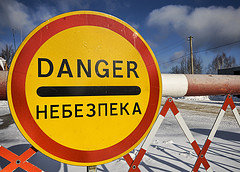Growth of GDP and Discontent in Egypt and Tunisia
by Eric Zencey
 The regime changes in Egypt and Tunisia have been hailed as victories for democracy, as proof of the liberalizing power of social networking media, as testimony to the power of nonviolent political action. All of that they may indeed be; but the events in Egypt and Tunisia also illustrate a major defect in our economic thinking, one from which we should draw a very different and much more cautionary conclusion.
The regime changes in Egypt and Tunisia have been hailed as victories for democracy, as proof of the liberalizing power of social networking media, as testimony to the power of nonviolent political action. All of that they may indeed be; but the events in Egypt and Tunisia also illustrate a major defect in our economic thinking, one from which we should draw a very different and much more cautionary conclusion.
The flaw in standard economic theory that’s behind the Middle East’s winter of discontent is the acceptance of gross domestic product (GDP) as an indicator of citizen well-being. A recent poll by the Gallup organization, reported in early February, found that despite significant gains in per capita GDP in both Egypt and Tunisia, the level of well-being of their citizens has been falling over the past decade. This decline in well-being certainly played a role in the unrest that put citizens in the streets, challenging their governments.
In Egypt, between 2005 and 2010 per capita GDP rose from $4,762 per year to $6,367. In Tunisia it rose from $7,182 to $9,489. But both countries saw a significant decline in the percentage of the population that is classified as thriving according to a standard, well established measure.
That measure is the Cantril Self-Anchoring Striving Scale, developed by a researcher named Hadley Cantril. It’s a survey research tool, and asks respondents to answer a few simple questions:
Please imagine a ladder with steps numbered from zero at the bottom to ten at the top. The top of the ladder represents the best possible life for you and the bottom represents the worst possible life for you. On which step of the ladder would you say you personally feel you are standing at the present time? On which step of the ladder do you think you will stand about five years from now?
To rank as “thriving,” respondents have to have positive views of their current place on the ladder (seven or higher) and positive expectations about the future (eight or higher). Below that, respondents are ranked as “struggling”—their “ladder-future” expectation is lower than the present, or both values fall below the thriving range. Below struggling is “suffering,” people who report their place on the ladder at four or below.
The Cantril Scale correlates with objective markers of well-being. Thrivers have fewer health problems and fewer sick days, while reporting less worry, stress, and anxiety and more enjoyment, happiness, and respect. Those in the struggling category report more daily stress and worry about money than the “thriving” respondents, and more than double the amount of sick days. Those in the “suffering” category are more likely to report that they lack basics like food and shelter, more likely to report physical pain, and more likely to experience higher levels of stress, worry, sadness, and anger. They have more than double the rate of diseases compared to “thriving” respondents.
In both countries, as GDP rose steadily, the number of citizens categorized as “thriving” fell. In Egypt, 29% of people reported themselves as thriving in 2005, but that number fell to just 11% in 2010. In Tunisia, Cantril Scale data are unavailable prior to 2008, when 24% of the population could be classified as thriving; that number fell to 14% in 2010, a 40% decline.
The nonviolent revolutions in both countries may have been motivated less by abstract commitment to democratic freedom than by widespread experience of a declining standard of living and increased economic insecurity, even in the face of rising GDP. Two factors contribute to this result that seems paradoxical within the standard model of economic thinking: (1) increasing inequality in income and (2) increasing food prices.
Thanks in part to the Aswan Dam, which interrupted the regular cycle by which Nile delta farmlands were re-nourished by annual flooding, Egypt has been the single largest importer of grain in the world. When Russia announced an embargo on grain exports (the result of unprecedented, climate-change-driven weather that scorched into ruin nearly half of Russia’s usual annual harvest), the price of food shot up. Before the embargo, the average Egyptian family spent 38% of its income on food (compared to 7% in the U.S.). Most simply couldn’t afford the higher prices, and hunger and food insecurity spread through the middle class. Perversely, GDP counted higher food prices as a positive contribution to well-being.
Because of that basic flaw, a rising GDP did not mean a rising standard of living. And even if GDP were a more accurate measure of material well-being, it would still be mathematically possible for a very large number of people to become worse off economically as per capita GDP rises. This situation could occur if there is growing income inequality (i.e., the benefits of increasing GDP aren’t widely shared). In Egypt and Tunisia, that mathematical possibility became an economic fact—and a politically charged social condition.
Declining standards of well-being are politically destabilizing, and lead naturally enough to sweeping support for regime change. In Egypt and Tunisia the regimes happened to be despotic, and the call for change came as a commitment to democracy, an end to corruption, and demands for civil liberties. But within democracies, declining standards of living can have the opposite effect. Open and institutionalized systems of regime change—voting—will absorb the discontent for a time, but if the decline lasts too long, and can’t be blamed on a particular party in power, pressure grows for stepping outside established parties for new, radical, revolutionary approaches. Democratic forms are no proof against a slide into repressive forms. In Germany in the 1930’s, a declining standard of living contributed to the rise of the Nazi party; Hitler was democratically elected to the office of Chancellor (and then proceeded to establish himself as Fuehrer).
As America’s perpetual-growth economy faces the reality of ecological limits, as climate change imposes costs and decreased well-being on us, as energy and other resource prices increase, we face the prospect of a widespread decline in our standard of living. Americans coming of age today are among the first generation who can’t be confident that they will be better off than their parents; by one widely used measure of well-being (the genuine progress indicator, which deducts loss of ecosystem services and other “disamenities” from the national accounts), the American standard of living has flatlined since the 1970s, despite continued strong growth in GDP.
Thus the cautionary lessons from Egypt and Tunisia. GDP is a measure of the commotion of money in an economy, not a measure of delivered well-being. If sustained or rising well-being is what is economically and politically desirable, we should measure it directly, instead of counting on GDP to do the job. And if we accept the idea of popular sovereignty—that governments rule with “the just consent of the governed,” as Jefferson put it in our Declaration of Independence—we must recognize that as the middle class goes, so goes the legitimacy of the regime in power. No system of government—despotic or democratic—fares well when the majority of its citizens experiences a declining standard of living.
When increasing the standard of living depends on continual expansion of the economy’s ecological footprint, that increase must at some point come to an end. The examples of Egypt and Tunisia invite us to ask: what then?
—
Eric Zencey is a visiting associate professor of historical and political studies at Empire State College of the State University of New York, and an affiliate of the Gund Institute of Ecological Economics at the University of Vermont. He is the author of the forthcoming The Other Road to Serfdom: Essays in Sustainable Democracy.
 Wikimedia Commons
Wikimedia Commons





The same phenomenon is now manifesting here in the UK : inequality is rising under the stewardship of a minority coalition intent on imposing ‘shock doctrine’ free market adjustments in the guise of the’Big Society’.
Public discontent is growing, although we still enjoy the comparative comforts provided by a western democracy. Nonetheless, as unemployment rises,particularly amongst the young, matched by rapid population growth and a drastic curtailment of the protection hitherto provided by the state, I foresee a period of significant unrest.
The countries of the middle east and north africa have little chance of delivering significant improvements in the lives of their burgeoning populations and I doubt that western style democracy will appear any time soon.
The alternative is the kind of social welfare programme run by groups like hamas and hizbollah: not a happy thought for most western governments and Israel.
As to the UK and US; more and more of us want the financiers to be reined in and called to account . Greedonomics is working only for the elite and relies on a growing pool of poorly paid and indebted consumers.
Eric Zencey:
This is a very smart article with very instructive foundation material for truth assessment and disciplinary integrity.
There are global contests and a spectrum of context to be considered as we evaluate the content of both experiences and scholarly analysis for the groundwork being settled in these regions (and perhaps as models for the regionalism / marginalized and rationalized global systemics…?). But it is vital to have an active comprehensive method based on realistic measures if we are to assess the all conclusive “policy” initiatives (and perhaps interloping interventions…) that are inevitably going to unfold our new base for history and the near future (and Near Eastern future specifically).
I am seriously looking forward to your book …forthcoming The Other Road to Serfdom: Essays in Sustainable Democracy. And I wish you well! Bruce
Interesting post to me also. The Cantril Scale sounds a little contrived, but congratulations.
I hope that instead of the looming backlashes, more movements like Brazil´s Landless Movement and other World Social Forum co-operative activist enterprises can organize, such as around the organic and fair trade movements, to create movements for sustainable democracy.